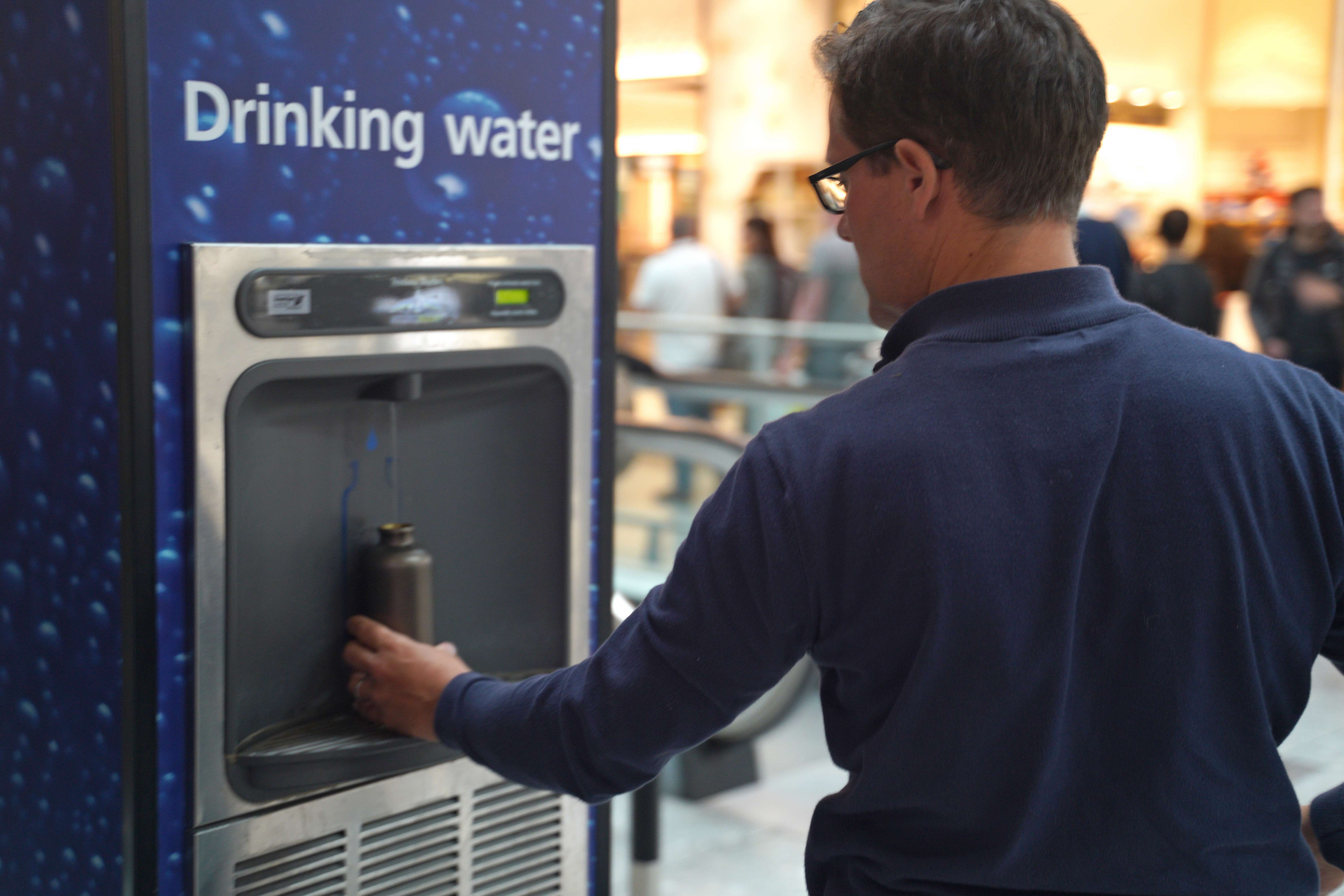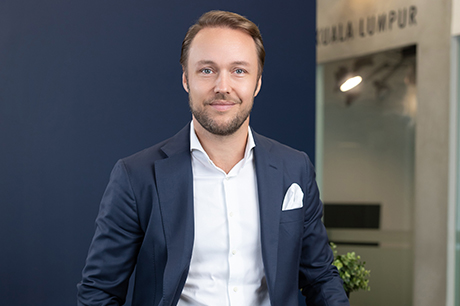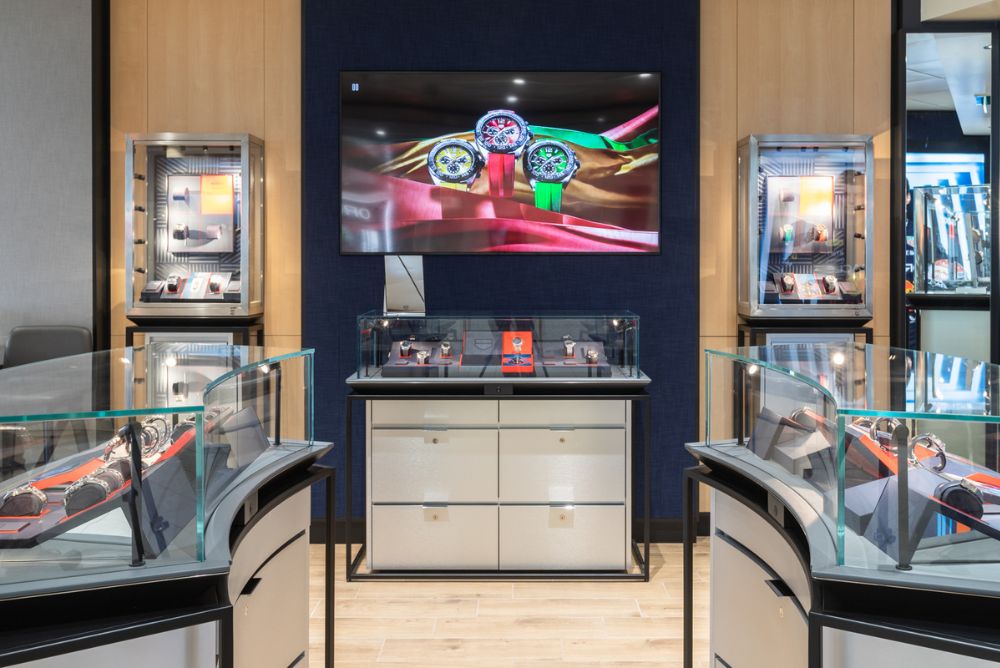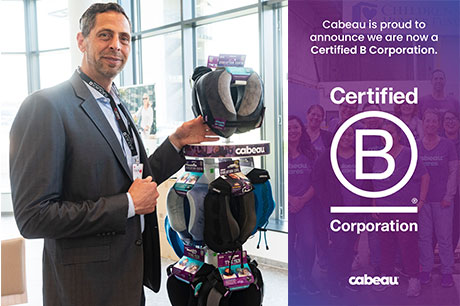Q&A: LHR’s Fraser Brown on sustainability ambitions
By Michael Barrett |
 In the latest feature from our airport sustainability series, Heathrow Airport’s Retail Director, Fraser Brown speaks exclusively – and candidly – about the airport’s sustainability activities and strategies as well as ambitions to holistically reduce its impact on the environment.
In the latest feature from our airport sustainability series, Heathrow Airport’s Retail Director, Fraser Brown speaks exclusively – and candidly – about the airport’s sustainability activities and strategies as well as ambitions to holistically reduce its impact on the environment.
As Brown reveals, the airport is putting sustainability at the core of its activity and addressing the need to minimise its environmental impact both internally as well as with all partners, aeronautical and commercial. At Heathrow, sustainability is not just a buzz word…
TRBusiness: Can you define the London Heathrow Airport approach to sustainability from an operational perspective?
FB: Heathrow is the second busiest airport in the world based on arriving and departing international passenger numbers. Clearly our activity as an airport has a direct environmental impact and that is compounded by the activities of the other businesses that support our operations.
Doing the right thing by the environment by mitigating our impact is an obligation which we accept and are doing our utmost to achieve. The most effective action is to take a holistic approach that looks at the environmental impacts, direct and indirect, that result from our activities as an airport.
That is why in 2017 we launched Heathrow 2.0, what you could call our manifesto committing us to leading the way in pioneering exciting new approaches to increase the positive impact we can make, while reducing the negative impacts of aviation.

At T5 British Airways has introduced zero-emission, remote-controlled Mototok tugs to conduct aircraft pushback.
For Heathrow this means being a place that can inspire and enable a positive future for the aviation industry. Heathrow 2.0 is our plan to grow the potential of our colleagues, people and businesses, and help make sure that air travel doesn’t come at the cost of the planet or affect the quality of life of local communities. Our goal is to pioneer more sustainable travel from the beginning to the end of every journey.
There are four pillars in Heathrow 2.0: a great place to work; a great place to live; a thriving sustainable economy; and a world worth travelling. In the interests of total transparency, the Heathrow 2.0 plan is on our website Heathrow.com for all to see.
In terms of achieving carbon neutral growth I can give you a few examples of how Heathrow is taking steps to operate and grow sustainably.
Firstly, we financially incentivise airlines to bring their cleanest and quietest planes to Heathrow through landing charges that reward or penalise. We also publish a Heathrow Quarterly Fly Quiet and Green League table of airlines performance.
Heathrow has pledged to ‘Go Electric’ installing 22 additional electric charging points and investing in electric vehicles across T5. This is in addition to the existing free-to-use electric car charging bays.

Kew’s Millennium Seed Bank at Wakehurst in Sussex, where Kew is creating one of the world’s greatest seed and fungal conservation sites.
At T5 British Airways has introduced zero-emission, remote-controlled Mototok tugs to conduct aircraft pushback. Heathrow has worked with BA to install an additional 25 charging points to support this. In 2018 zero-emission driverless pods, transporting passengers to and from T5’s car park, helped to remove bus journeys and reduce car emissions.
The ACI Carbon Accreditation Programme is an excellent initiative by airports globally. What measures has the airport taken to reduce carbon emissions across its retail and other commercial operations?
FB: Gaining ACI Carbon Accreditation is just one measure of the many initiatives that we are undertaking. Heathrow Retail is also making its a contribution to a thriving but sustainable retail economy at our airport. Here are three examples initiated in 2019.
We have implemented a long-term strategy to ensure the production of a Heathrow Shopping bag that will help reduce the use of single-use plastic bags at Heathrow. In 2018 we partnered with Royal Botanical Gardens Kew to develop an exclusive sustainable Heathrow shopping bag.
The initiative was part of the wider strategy connected to Heathrow’s 2.0 plan. Currently legislation means as a travel hub Heathrow is exempt from charging on single use plastic bags.
Through the contribution from each sale the Heathrow Kew bag supports Kew’s Millennium Seed Bank at Wakehurst in Sussex, where Kew is creating one of the world’s greatest seed and fungal conservation sites. The seed bank works as an ‘insurance policy’ against plant extinction – especially for rare, endemic and economically important species – protecting plant species permanently for future generations.
Each bag sale contributes £1.00 (US$1.3) to RBG Kew to help fund their work as a global resource for plant knowledge and conservation. The bag is made from 80% recycled plastic water bottles and each bag takes three plastic bottles out of waste. Initial production of 100,000 bags in 2019 took 300,000 plastic bottles out of waste and recycled. The sustainability standards were set out from the beginning with clear traceability on the product sourcing and packaging. In review the project is now looking to become carbon neutral, to align with other Heathrow projects.
OVER 100 PERMANENT WATER FOUNTAINS
Another environmental initiative led by Heathrow Retail is our support for Refill, the UK’s national scheme that is fighting the growing scourge of environmentally harmful waste created by single-use plastic, by preventing the use of tens of millions of plastic bottles every year, as well as increasing the availability of quality drinking-water for passengers.
We have installed over 100 permanent drinking-water fountains across our four terminals at Heathrow for anyone to fill up their water-bottles free of charge. Alternatively, people can ask for free drinking water in our food and beverage retailers.
Heathrow makes it easy for passengers to take advantage of this initiative by locating them near the rest rooms and with clear sign posting to help identify them.
A WORLD FIRST
A third environmental initiative led by Heathrow is our support for the Sustainable Fish initiative. In 2019 Heathrow became the world’s first Sustainable Fish Airport.
The Sustainable Fish initiative is the latest chapter in Heathrow’s work with the UK’s Sustainable Restaurant Association and recognises the vital importance of minimising biodiversity loss. In this case, the focus is the loss of thriving marine ecosystems that are vital for preventing climate change.
By working with Sustain, the Alliance for Better Food and Farming, the Sustainable Restaurant Association and the restaurant and café tenants at the airport, all of Heathrow’s restaurants have removed ‘red-rated’ fish from their menus and now promote the best choices of sustainable seafood menu items to their customers. Red-rated fish are fish stocks or species that are endangered as a result of over-fishing and destructive fishing methods, as rated by the Marine Conservation Society.

The Sustainable Fish initiative is the latest chapter in Heathrow’s work with the UK’s Sustainable Restaurant Association.
Heathrow’s airport restaurant businesses are now pledged to source from more plentiful stocks, more responsible farms, or from fish caught by pole-and-line, which is a less destructive fishing method. So today, the 80 million plus passengers who travel through the world’s second busiest international airport can enjoy any of more than 20 fish species served at Heathrow, knowing they are all sustainably sourced.
A significant cultural positive arising from these projects has been their power to create a talking point on sustainability for both colleagues and passengers; helping spark conversations about change and how the small individual things by many people add up to big worthwhile step changes.
Often sustainability is associated with higher costs and higher prices for the consumer. In some cases, a switch to more sustainable solutions such as renewable energies for example can lead to improved efficiencies and lower costs over the long term. What is your experience with the cost of going green?
FB: It is certainly true that some sustainability initiatives can mean higher costs and higher prices for the consumer. If the initiative delivers a greater good, then this is surely a price should be seen as an investment for the long term and worth paying in the short term.
This is the view that we take, and we are investing millions in infrastructure and operational methods to improve efficiencies and lower costs over the long term.

RBG Kew staff have also become part of the Heathrow ‘Welcome Character’ campaign with a botanist and a horticulturist featuring on billboards in the Central Terminal Area, Terminal 5, and perimeter roads giving exposure to 50,000 plus passengers daily.
How far-reaching is the sustainability strategy? Are you able to influence stakeholders, including investors, airlines, designers and commercial partners of the airport to introduce more sustainable practices? How have you approached this?
FB: To answer the first part of that question, it can reach into the furthest corners of our own activity and all the businesses that operate at Heathrow.
Many of our environmental initiatives rely on working closely with the 400 other “Team Heathrow” companies that operate at the airport. Deeper collaboration is starting to yield real benefits. We share our own sustainability visions and challenges with them so we can work more closely together on projects that can deliver real change.
There are a number of support services for our retailers that help them help us with mitigating their environmental impacts upon Heathrow. For example, their transport of goods around Heathrow to their F&B or retail units is significantly reduced by the Heathrow (Goods) Consolidation Centre that enables them to just deliver to Heathrow at one point after which our fleet of eco-friendly lorries make consolidated deliveries to each terminal. This means a huge reduction in emissions as a result of greatly reduced vehicle movements.
Other examples of where we rely on the contribution of others at Heathrow are our retail and F&B unit design, fit-out and operations guidelines which call for best practice in terms of conserving energy use and water use.
Approximately one third of all food produced in the world intended for human consumption is lost or wasted. Over ten million tonnes of food, worth £17billion (US$22billion), is wasted in the UK every year. This wasted food takes fresh water, land, labour and energy to produce. If it were a country, food waste would be the third highest emitter of greenhouse gases in the world.
We see the reduction of food wastage at Heathrow as a major responsibility So we also provide a free collection service and disposal service for things such as waste cooking materials like cooking oil, which goes into recycling as well as for unsold food which, if still edible can go to charities.
Do you communicate with passengers about your sustainable practices / more environmentally friendly approach? If so, what do they say and feel about it?
FB: We do this wherever we can.
The Heathrow Kew Gardens shopping bag initiative has brought Kew’s work to the attention of Heathrow’s 80 million passengers and sales will deliver valuable additional funding and support Heathrow’s own mission to encourage the use of sustainable shopping bags. Millions of passengers are being exposed to the initiative along with the involvement of retail shop staff across Heathrow.
RBG Kew staff have also become part of the Heathrow ‘Welcome Character’ campaign with a botanist and a horticulturist featuring on billboards in the Central Terminal Area, Terminal 5, and perimeter roads giving exposure to 50,000 plus passengers daily. During the school half term holidays Terminal 2 (with 18million passengers per annum) hosted colouring walls using the bag design as a canvas. Chinese New Year at Heathrow also showcased the bags which were given away daily in the terminals in the “red envelopes” as part of Heathrow’s surprise and delight activities.
In July last year, Terminal 2 installed a recycled textile tapestry of a world map on the balcony post-security for a month-long promotion that linked destinations to plants around the world, allowing Heathrow to engage with passengers on the Kew project and give them stories and information about the work that Kew undertakes. The month-long summer promotion engaged with over 600,000 passengers with a wide range of social media engagement. The tapestry now has a permanent home in Terminal 2 as part of the passenger journey.
This exposure for RBG Kew is significant across a multinational passenger base helping us showcase not just the bag but all the sustainable projects Heathrow is undertaking. The passenger engagement and feedback on this project was immense.
Through our partnership with Refill, Refill is also helping educate our passengers about being able to take an empty bottle through airport security to fill up later at our drinking-water fountains. We have also improved signage within our terminals to encourage more people to refill and we’re working with Refill to make sure all these fountains can be found on the Refill app. Not only this, but we’re also engaging with our many cafes, restaurants and lounges to encourage them to be listed on the Refill app and proudly display the Refill sticker where possible in their restaurants, bars and cafes at Heathrow.
What do you see are the major challenges for companies in the travel retail industry today to adopting more sustainable business practices? How can these be addressed? What more can the industry do?
FB: For an airport one major challenge is to communicate with effectively and drive all our business partners, the 400+ companies that we call Team Heathrow, to get behind us not just by their own efforts but by driving the message as far as they can down their own supply chains.
It would be true to say that we are pushing against an open door as there is no doubt all of us involved in aviation recognise the huge responsibility that we have to ensure it is sustainable for future generations of air travellers. Making our commitments publicly known is key to gaining awareness and support for us. Just by way of examples, in terms of ethical retail, in the past 18 months we have said we want to achieve a number of goals. Firstly, we want to enable the recycling of all coffee cups collected from retail and lounge business partners with all retailers using a standardised paper cup that can be collected by Heathrow and recycled in the UK. We are also exploring how a reuse system could be implemented across all terminals and we want to encourage and incentivise passengers to bring personal reusable cups. We are looking to work towards removing all single-use plastics from sale, such as bottles, straws and stirrers and finally reducing our packaging waste.
We are well on the way with all these.
How did you personally become more environmentally aware and engaged professionally?
FB: It comes with the role description of a Heathrow Retail Director. I measure my success not just by sales performance but by the successful implementation of ethical retail standards.
JEDCO launches multi-category tenders at KAIA T1
Jeddah Airports Company (JEDCO KSA) has issued a request for proposals for several...
Alcohol insights: Conversion up, spend down in Q4
Conversion of visitors in the alcohol category in duty free has risen to 54% in Q4 2023,...
Heinemann Asia Pacific makes breakthrough in New Zealand at AKL
Heinemann Asia Pacific is set to enter the New Zealand market with three new retail concepts at...
-
 International,
International,JEDCO launches multi-category tenders at KAIA T1
-
 International,
International,Alcohol insights: Conversion up, spend down in Q4
-


In the Magazine
TRBusiness Magazine is free to access. Read the latest issue now.

 Trbusiness. The travel retail Trbusiness. The magazine for global retail and duty free professionals.
Trbusiness. The travel retail Trbusiness. The magazine for global retail and duty free professionals.

























